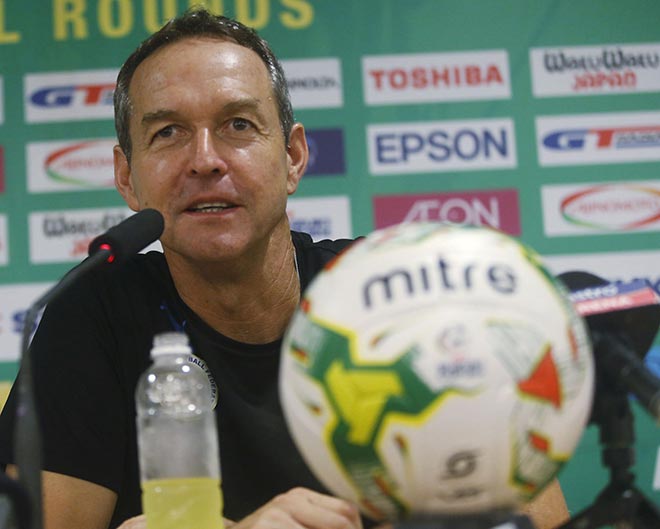
Thomas Dooley
HE was at the forefront of soccer’s growth in the United States more than two decades ago and now Thomas Dooley is hoping for a similar surge in popularity in the Philippines.
The Azkals’ head coach – and former Team USA captain – is doing his part by overseeing a World Cup qualifying campaign that has so far exceeded expectations. The Philippines’ unbeaten record goes on the line next week when they host 2011 Asian Cup semifinalists Uzbekistan.
Football remains an emerging sport in Southeast Asia’s second most populous nation, but there is definitely a buzz about Dooley’s team after two impressive victories in Group H.
“I think the teams that we play now are a little bit aware of us and take us a little bit more seriously,” Dooley told ESPN FC. “Can we beat Uzbekistan? If everything goes right for us and they under-estimate us, there’s a possibility.”
Dooley is wearing an official T-shirt and tracksuit as he chats in a Kuala Lumpur hotel on the sidelines of the recent AFC National Coaches Conference. He turns 54 in December, but doesn’t look a lot different to the rangy central defender who captained the US at the 1998 World Cup before retiring from the national team the following year with 81 caps and seven goals.
Born to German mother and a US Army father, Dooley had more than a decade of professional football in Germany before being recruited by US soccer in 1992 as it tried to beef up its squad ahead of hosting the World Cup for the first time.
Now, he’s overseeing a similar process – set in motion several years ago – that identifies foreign talent with Filipino heritage. Recent recruits include Australian-born Iain Ramsay, whose mother was born in the Philippines, along with former Austria U19 defender Stephan Palla and ex-England U20 midfielder Luke Woodland.
Dooley took over as Philippines head coach in February 2014 having briefly served as an assistant to USA boss Jurgen Klinsmann three years earlier. As players, Dooley and Klinsmann faced off at the 1998 World Cup in Paris where Germany defeated the Americans 2-0 in their opening group game.
“In the US, we had a similar situation (to the Philippines) where we started to grow football. It’s all like a snowball system as I always try to explain to the people in the US, in Germany, and now with the Philippines,” he said.
Success naturally creates interest amongst general sports fans. But unlike the US which has had a strong youth soccer culture for more than a quarter of a century, Philippines’ football is grappling with a nation’s obsession with basketball.
“Here it is not a generation problem, it is a culture problem because the kids love basketball,” he said. “But when they see football on billboards, in papers, on TV and watch us play, then they can maybe change their mind and see a better life for themselves through football. I think then we could have a place like Argentina where we can develop many good players.”
Under Dooley, Philippines gave another good account of themselves in last year’s AFF Suzuki Cup where they made the semifinals for the third straight time.
But June’s 2-1 win at home to Bahrain – who were only a playoff victory away from qualifying for the 2010 World Cup – followed by a 2-0 triumph over Yemen in Doha in their second AFC qualifier – was an indicator of true progress.
But the Uzbeks, who beat North Korea and Saudi Arabia at January’s Asian Cup and sit 49 places higher on the FIFA rankings, will be a tougher proposition.
To have any chance to advancing to the third round of AFC qualifiers, the Philippines need to finish in the top two of a group that also includes North Korea. Not many of the Azkals’ squad are looking forward to October’s trip to Pyongyang.
“Anything is possible in football,” he smiles. “I’m very happy with the way we’re playing.”
Jason Dasey is Senior Editor of ESPN FC (formerly ESPN Soccernet), Borneo’s most popular football website which has a Southeast Asia edition. Twitter: @ESPNFC
